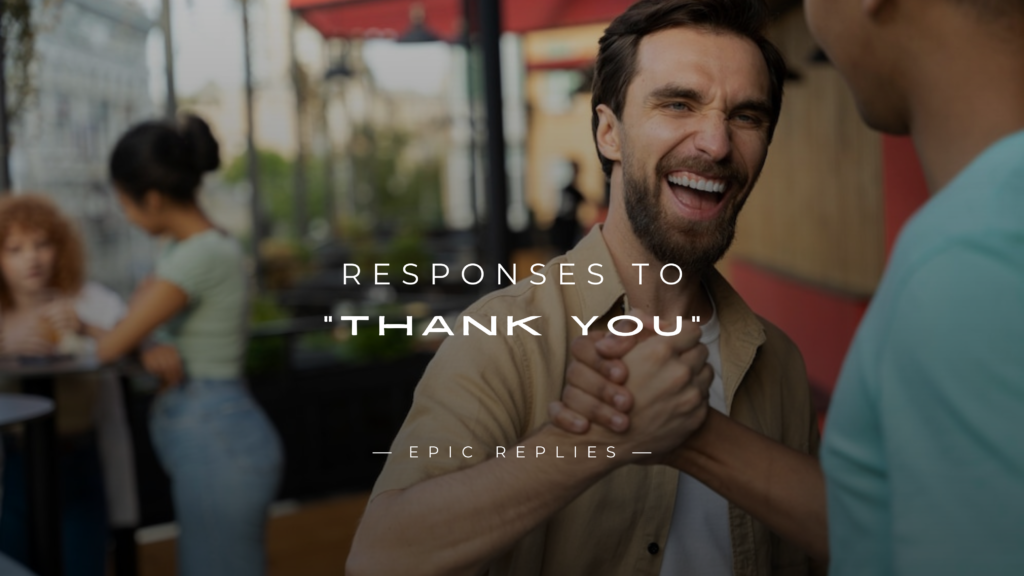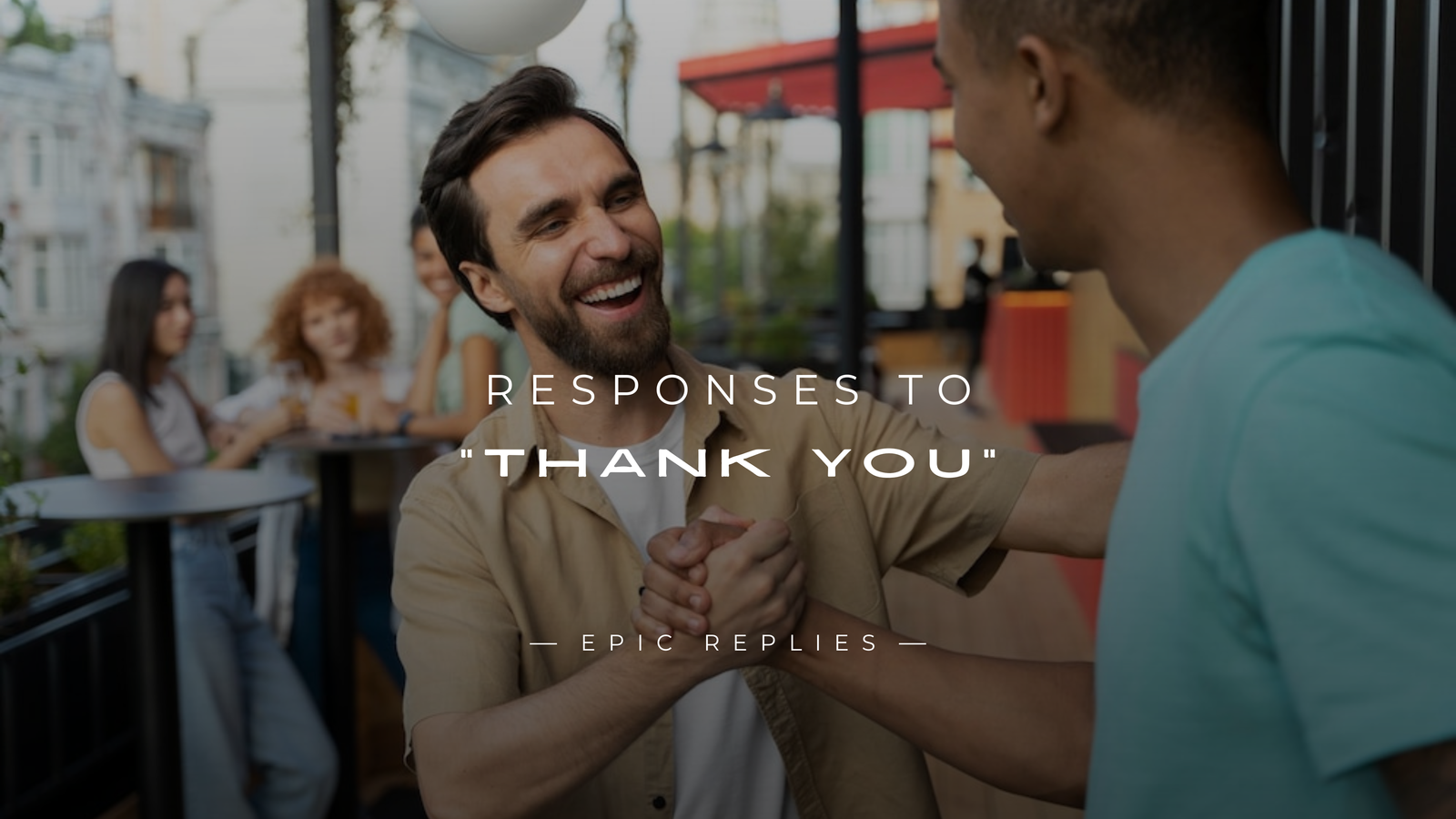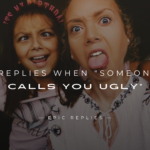Have you ever had that slightly awkward moment where someone says “thank you”, and you’re not quite sure how to reply? It seems like such a small thing, right? But those two words carry a lot of weight. They acknowledge your effort, your kindness, or your presence. And how you respond can either keep the warm energy flowing—or stop it in its tracks.
In this article, we’ll explore why responding to “thank you” matters, what different phrases mean, how to choose the right response for different situations, and even how your tone, body language, and culture can influence the perfect reply. Whether you’re at work, chatting with friends, or texting your mom, this guide will help you respond with ease and sincerity.

220+ Good Responses to “Thank You”
Traditional/Polite
- You’re very welcome.
- My pleasure.
- Of course!
- It was no trouble at all.
- Always happy to help.
- Think nothing of it.
- No thanks needed.
- I’m just glad I could assist.
- Happy to be of service.
- It’s the least I could do.
Warm & Friendly
- Anytime, really!
- You got it!
- I’m always here for you.
- Don’t mention it, seriously.
- You’re more than welcome!
- It was truly my pleasure.
- I’m glad you thought of me.
- I’ve got your back.
- Of course—anything for you.
- I’m just happy it helped.
Casual/Relaxed
- No problem at all!
- No worries.
- Sure thing!
- All good.
- Don’t sweat it.
- Glad to help!
- You’re all set!
- Easy peasy.
- It’s cool—glad to do it.
- That’s what I’m here for!
Formal/Professional
- I was happy to assist.
- Thank you for the opportunity to help.
- It’s part of the service.
- Please don’t hesitate to reach out again.
- I’m glad I could be of assistance.
- We appreciate your kind words.
- It’s our goal to make things easier for you.
- Your satisfaction means a lot to us.
- Thank you for trusting me with this.
- I’m always available should you need further support.
Humble
- It wasn’t much, really.
- I’m just glad I could help.
- I didn’t do anything special.
- You’re too kind.
- I’m happy it worked out.
- Just doing my part.
- Anyone would’ve done the same.
- I appreciate the thanks, but it was a team effort.
- It was a small thing, but I’m glad it helped.
- Really, it was nothing.
Encouraging
- I’m glad it helped—you’ve got this!
- Just keep going—you’re doing great.
- Happy to support your journey.
- You’re more capable than you think.
- Keep up the great work!
- One step at a time—you’re on the right path.
- You’ve got all it takes.
- I’ll always be cheering you on.
- You’re doing amazing.
- Remember, you’ve come a long way already!
Supportive
- I’ll always be here when you need me.
- You don’t have to go through anything alone.
- I care about you—always happy to help.
- Let me know if there’s anything else I can do.
- Your well-being means a lot to me.
- I’ve got your back, always.
- It’s okay to lean on someone now and then.
- Helping you helps me too.
- You’re not alone—I’m with you.
- That’s what friends (or family, teammates, etc.) are for.
Grateful (Reciprocated Thanks)
- Thank you—it really means a lot.
- I should be the one thanking you.
- Right back at you!
- I appreciate you too.
- Thanks for trusting me.
- It’s mutual—I’m grateful as well.
- We make a good team!
- That means a lot—thank you.
- Couldn’t have done it without you either.
- I’m just as thankful for you.
Empathetic
- I’m really glad I could be there for you.
- I know it wasn’t easy—I’m proud of you.
- That means a lot to hear.
- You’re not alone in this.
- I understand how much this meant.
- I’m here for you anytime.
- I can imagine how hard that was—happy to help.
- We’re in this together.
- I’m always just a message away.
- You don’t have to thank me—I care about you.
Light-Hearted
- Just trying to keep my good karma streak going!
- I accept cookies as thanks.
- Don’t tell anyone—I have a reputation to uphold.
- I do one good deed a day—you were today’s lucky winner!
- I live to impress!
- Just putting my superhero cape to good use.
- You owe me big time! (Kidding!)
- I’ll add it to my list of heroic acts.
- It was either that or watching cat videos.
- Hey, I’m glad it didn’t blow up—success!
Confident
- I knew you’d appreciate it.
- I’ve got you covered.
- That’s what I do.
- I always aim to deliver.
- I try to keep my standards high.
- You’re in good hands.
- I make it look easy, right?
- Just another day of getting things done.
- I’ve been waiting to flex that skill!
- It’s good to be appreciated.
Dismissive (In a Kind Way)
- Ah, no big deal.
- It was nothing, really.
- Don’t even think about it.
- Totally fine—no need to thank me.
- That’s just what people do.
- No need for thanks—we’re all in this together.
- It’s not worth a thank you, honestly.
- You’d do the same for me.
- It was just a tiny thing.
- Not a problem—forget about it.
Religious/Spiritual
- All glory to God.
- It’s a blessing to be able to help.
- Thank God it worked out.
- I was just a vessel—He made it happen.
- I believe we were meant to cross paths.
- I’m grateful to be of service.
- That’s what faith calls us to do.
- I’m just answering the call.
- I thank God for the chance to help.
- May God continue to bless you.
Cultural/Regional
- No bother at all! (UK/Ireland)
- That’s grand—glad to help. (Ireland)
- My door’s always open. (Southern U.S.)
- De nada! (Spanish-speaking regions)
- Hakuna matata! (East African slang for “no problem”)
- It’s all good, mate. (Australia/UK)
- Shukran, and right back at ya! (Arabic-infused English)
- Don’t mention it, la! (Singaporean English)
- Happy to lend a hand, eh? (Canada)
- No trouble at all, pal. (Scotland/Northern UK)
Professional Warmth
- I’m really glad I could support you on this.
- It’s always a pleasure working with you.
- Your feedback means a lot—thank you.
- I’m grateful to be part of this process.
- I appreciate the kind words—it motivates me to keep doing my best.
- Thank you for the chance to contribute.
- We’re in this together, and I’m glad to help.
- I’m happy the outcome was what you needed.
- It’s important to me that you’re satisfied—glad I could help.
- Always here to assist, and I appreciate your trust.
Mission-Driven
- This is why I do what I do.
- I’m just grateful to be making a difference.
- It’s my purpose to serve in moments like this.
- I feel honored to help in any way I can.
- That’s the mission, and I’m glad to be part of it.
- We’re all working toward something bigger—thank you for being part of it.
- It’s deeply rewarding to see it make a difference.
- I do it because I care, not for recognition—but thank you.
- It’s not just work—it’s what I believe in.
- I’m proud to stand for something that helps people like you.
Playful
- Boom—nailed it!
- I try to make helpful look cool.
- I’ll add that to my list of achievements.
- Just saving the day, one good deed at a time!
- I came, I saw, I helped.
- If I had a trophy, I’d give it to myself.
- Look at me go—basically a legend.
- I’ll expect fan mail by next week.
- Now I vanish into the night!
- Your appreciation has been received and added to my ego.
Sarcastic (Friendly Tone)
- Wow, finally—some recognition!
- I’ll be insufferable for the rest of the day now.
- Took you long enough to say it!
- That’s all? No parade or confetti?
- It’s about time someone noticed my genius.
- I was starting to wonder if you’d forgotten me!
- One “thank you” closer to my sainthood.
- I accept praise in the form of snacks.
- I do expect a statue someday.
- Flattery will get you everywhere.
Sincere
- That really means a lot—thank you.
- I’m truly grateful for your kind words.
- I’m happy I could make a difference.
- Knowing it helped you is enough for me.
- You’ve made my day by saying that.
- I don’t take your thanks lightly—thank you.
- It was a privilege to help.
- That’s incredibly kind of you to say.
- I appreciate your appreciation more than you know.
- It’s moments like this that remind me why I care.
Reserved
- Nods Anytime.
- Of course.
- Sure.
- Glad I could.
- No problem.
- Smiles quietly
- Yeah, happy to help.
- It’s fine.
- Not a big deal.
- Mhm.
Service-Oriented
- We’re always here to help.
- It’s our goal to make your experience smooth.
- We truly appreciate your feedback.
- Your satisfaction is our top priority.
- Thanks for giving us the opportunity to serve you.
- We’re glad we could meet your needs.
- Just doing our part to help things run better.
- Always happy to assist—please reach out anytime.
- We value your trust in us.
- It was our pleasure—thank you for choosing us.
Pay-it-Forward Inspired
- Just pass the kindness along.
- Help someone else when you get the chance.
- That’s what community is about.
- We rise by lifting others—keep it going.
- If you’re ever in the position, do the same.
- I was helped once too—just paying it forward.
- Keep the good going!
- The world needs more of this energy—spread it.
- Hope you’ll do the same for someone else someday.
- Helping you helps the world a little too.
Why Responses to “Thank You” Matter
The Power of Acknowledgment
When someone says “thank you,” it’s more than just being polite. They’re expressing appreciation for something you did—big or small. And when you respond, you’re acknowledging their gratitude. This creates a full-circle moment that makes both people feel good. Think of it like completing a handshake. It’s a subtle yet powerful form of human connection.
Creating Positive Communication Cycles
A thoughtful reply to “thank you” builds trust and goodwill. When you consistently respond with sincerity, you show that you’re someone who values kindness, respect, and emotional intelligence. It may seem small, but these tiny moments add up, especially in personal relationships and professional settings.
Common Responses to “Thank You”
Let’s go over some of the most commonly used responses to “thank you” and what they really mean.
“You’re Welcome” – The Classic Choice
This is the timeless, go-to response. It’s polite, simple, and appropriate in almost every situation. Whether you’re at a business meeting or helping someone with their groceries, “you’re welcome” fits right in.
“No Problem” – Casual and Modern
This phrase has gained popularity, especially among younger people. It implies that what you did wasn’t an inconvenience. It’s friendly and relaxed but may be too informal in professional or traditional settings.
“My Pleasure” – Polite and Professional
Want to sound like someone from a five-star hotel? This one’s for you. “My pleasure” conveys that you were happy to help. It’s especially useful in customer service, formal settings, or when you want to leave a good impression.
“Anytime” – Friendly and Open-Ended
“Anytime” gives off warm, supportive vibes. It tells the person they can count on you in the future. It’s excellent among friends, colleagues, or family members you’re close to.
“Don’t Mention It” – Humble and Modest
This response suggests that the help you gave was no big deal and doesn’t even require thanks. While it’s humble, it can sound dismissive if used the wrong way. So use it gently and with a smile.
Choosing the Right Response Based on Context
How you respond often depends on where you are, who you’re talking to, and what the tone of the situation is.
Professional Settings
In the workplace, you want to stay polite and professional. Stick with responses like:
- “You’re welcome.”
- “It was my pleasure.”
- “Happy to help.”
These phrases show respect and reinforce a culture of collaboration.
Friendships and Casual Conversations
With friends, you can loosen up and go with responses that feel more natural and laid-back:
- “No worries.”
- “Of course!”
- “You got it!”
Here, your tone matters just as much as your words. Keep it friendly and real.
Family Interactions
In family dynamics, responses often carry more emotion. Depending on the relationship, you might say:
- “Anything for you.”
- “You don’t have to thank me.”
- “That’s what family is for.”
It’s all about emotional connection and trust in this space.
Text and Online Chats
When texting, you want to keep things quick but still warm. Some good digital responses:
- “Np 😊”
- “YW!”
- “👍”
Emojis can help convey tone and warmth, especially since texts don’t include facial expressions or vocal inflection.
How Tone and Body Language Influence Your Response
Matching Energy with Words
The way you say something can completely change how it’s received. If you mumble “you’re welcome” while looking away, it won’t carry much warmth. On the flip side, saying it with eye contact and a genuine tone adds authenticity.
The Role of Eye Contact and Smile
Non-verbal cues like eye contact and a smile amplify the sincerity of your words. They say, “I’m present. I heard you. And I care.” Even a quick nod can make your reply feel more heartfelt.
Cultural Considerations When Responding
Formal vs Informal Cultures
Different cultures have different norms for gratitude and politeness. In many Asian cultures, humility is highly valued. So, you may hear responses like, “It was nothing” or even just a silent nod. In Western cultures, explicit verbal responses are more common and expected.
Language Barriers and Nuance
If you’re speaking with someone who isn’t fluent in English, keep your reply clear and simple. Avoid idioms or sarcastic tones, as these might be misinterpreted. Stick with universal responses like “you’re welcome” or “happy to help.”
Creative and Thoughtful Alternatives to “You’re Welcome”
Personalized Responses
Adding a personal touch to your reply can leave a lasting impression. Instead of a generic “you’re welcome,” try something like:
- “Glad I could be there for you.”
- “I know how busy you are—happy to take care of it.”
These show that you were thoughtful and intentional.
Humor and Warmth in Replies
If the relationship allows for it, humor is a great way to make the conversation memorable:
- “I accept payments in cookies.”
- “Anytime! Just not before coffee…”
Playful responses like these are perfect for close friends and lighthearted moments.
What to Avoid When Responding
Being Dismissive or Sarcastic
Responses like:
- “Yeah, whatever.”
- “Finally, someone noticed.”
These might seem funny to you but can come off as rude or arrogant. Gratitude deserves grace, not sarcasm.
Overcomplicating a Simple Thank You
Sometimes we overthink it and launch into an explanation of why the help wasn’t a big deal. Don’t downplay yourself too much. A simple, confident reply shows humility and self-respect.
Teaching Kids How to Respond to Gratitude
Helping kids learn how to respond to “thank you” sets them up for social success. Teach them:
- The importance of acknowledging kindness
- Easy responses like “you’re welcome” or “no problem”
- When to use polite tone and body language
Role-playing can help, too. Practice real-life scenarios where they help someone and get thanked.
Using Technology to Acknowledge “Thank You”
In our digital age, gratitude travels through texts, emails, and even DMs. Here are some quick ways to respond:
- Email (formal): “You’re very welcome. Let me know if there’s anything else I can assist with.”
- Text (casual): “Of course! Anytime 😊”
- DM (fun): “Always got your back 🙌”
Even a short emoji can say a lot—just make sure it matches the tone.
Conclusion
In conclusion, having a variety of thoughtful and appropriate responses to “Thank You” can enhance your communication skills and make your interactions more meaningful. Whether you’re looking for something casual, formal, or even humorous, there’s always a response that fits the situation. By using these responses, you can make others feel appreciated and respected while keeping the conversation going smoothly. If you found these “Thank You” responses helpful, you might also enjoy exploring our list of “220+ Best Responses to ‘Sorry’ That Leave An Impact,” which can help you handle apologies with grace. Check it out here: 220+ Best Responses to “Sorry” That Leave An Impact.
FAQs
Q. What’s the best response to “Thank you” in a formal email?
In formal emails, go with professional and polished responses like “You’re welcome,” “It was my pleasure,” or “Happy to help.” Keep it courteous and direct.
Q. Is it rude to say “no problem” instead of “you’re welcome”?
It depends on context. “No problem” is fine in casual situations, but in formal or older generational settings, it might come off as dismissive. When in doubt, stick to “you’re welcome.”
Q. How can I teach my child to respond politely to “thank you”?
Lead by example. Use stories, role-playing, and positive reinforcement to show them why and how to respond kindly. Start with basic replies like “you’re welcome.”
Q. Are there cultural taboos around saying “you’re welcome”?
Yes. In some cultures, acknowledging thanks too directly can be seen as boastful. Always consider cultural context and, when in doubt, observe how locals respond.
Q. Can emojis be used as a response to “thank you” in texts?
Absolutely! Emojis like 😊, 🙌, or 👍 can add warmth and friendliness. Just make sure the tone fits the relationship and situation.










